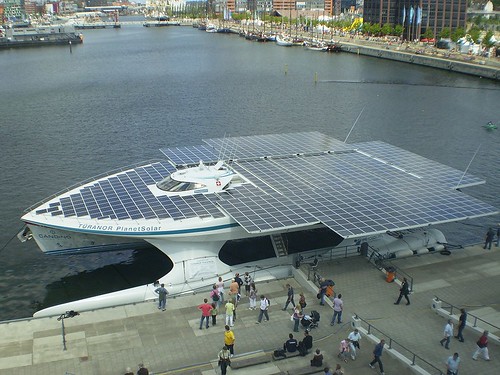Into the 21st century, a new problem is recognized as a threat to the international fishing industry: climate change. There are many known impacts on fisheries and aquaculture as a result of climate change and many known solutions to keep them at bay, but these issues need to be taken more seriously by fishing industries. The broad affect of climate change on the fisheries is the warming of the oceans; this in turn ruins the natural habitats of fish. One issue from this broader issue that has recently received fair treatment in the Canadian media is the study of decreasing fish size as a result of climate change. An assistant professor at the University of British Columbia, William Cheung stated, “Our study shows a substantial reduction in the maximum body size of fish”. Cheung claims that the heating of the ocean waters causes the body temperature of the fish to heat up which in turn gives the fish a higher metabolism. With a higher metabolism the fish require more oxygen, but with climate change, there is less oxygen in the oceans. “Without the oxygen, fish don’t grow.”, Cheung put it in simple context. The lack of fish size presents an issue for the fishing industry because a dangerous easy path is to over-fish and this overfishing could possibly lead to conflict because it will cause countries to clash. I’m not trying to be pessimistic, but history does repeat itself. A good example of fishing conflict in the past, though a non-climate change related issue, was the Turbot War where Spain was overfishing just outside of Canadian waters on the east coast, which affected the Canadian fishing industry in Newfoundland. This in turn led to a conflict; thank goodness not an actual armed conflict, but a diplomatic mess all the same.
Even though I want to have hope, it’s hard for me to believe internationally that world fisheries will face the problem of climate change in a reasonable manner, but for what’s at stake we need to. Like most industries and government facing climate change, there needs to be much more commitment and mental change to keep the issue at the forefront of decisions. This is the exact conclusion other researchers came to in another article on climate change, “Government and industry need to anticipate changes, not simply react to them.” It’s simply not acceptable in this day and age with climate change to merely make small-term reactions to these problems, we need to innovate our current standards to effectively prepare for these problems. Practically, we need solutions in advance.
Solutions aren’t easy to come by if people on the front line aren’t thoroughly educated on climate change. Education is the first step to solving any problem, how do you go about making a solution, if you don’t understand the issue? This doesn’t mean merely teaching a couple “high office” people about climate change in hopes they will spread the word. This means teaching everybody at every level of the fishing industry. Once a thorough education is established, then there is a starting point to create a solution. There are many solutions that have been developed, but I believe the key variable in any solution towards climate change is a technological change. I’m not an expert on mechanics, but a technology I can think of off the top of my head is an alternative energy source like solar power. Solar power can be used to power the fishing vessels which go out to sea, and this would help cut down fuel emissions.

Do you think a solar powered such as this could be converted to a fishing vessel?

Hey Colby,
Interesting topic seeing that food production/availability and climate change is a increasingly hot topic and issue in our world. My only question is if fishing in particular is more of a regional disparity than a national or global cause. Compared to the staples of the entire world such as grain and water, maybe fishing is a economy which is reaching its ends. Seems like a radical thought, but with the growing number of setbacks such as fuel usage for the vessels and political boundary lines maybe fishing is a dated and unnecessary consumer practice.
Food for thought?
Thanks! Myra
Hey Colby, I learned a lot from reading your post. I never even heard about the decrease in fish size. I guess its true that you learn something new every day. To back up your facts for example, an image (warming of oceans over time, etc.) containing graphs would have been helpful. Overall, your post opened my view on climate change a bit more. Really interesting. Thanks for sharing.
Thanks for both of your feedback. Myra, I can see larger limitations on fishing, but I don’t believe it will ever end. In Newfoundland , fishing is still common, but it did used to be much larger than it is now. Although, I don’t believe fishing will ever officially end; I believe it’s too ingrained in our society. It’s just like that game we played, even if all countries agreed to not fish for sake of the climate, there will always be countries who will break the agreement and a chain reaction would start. Nikson, yes graphs would be a good idea just to give people a visual idea of the implications.